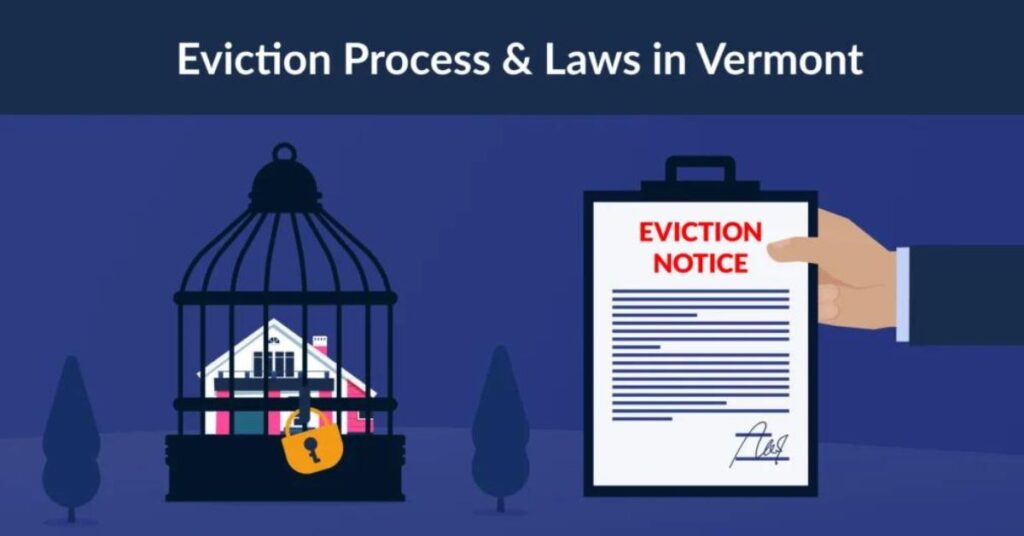If you’re dealing with Vermont evictions, understanding the essential steps and legal requirements is key. As a landlord or tenant in Vermont, you need to know about eviction notice types, filing procedures, court summons, tenant responses, and judgment processes.
This guide equips you with the knowledge to handle eviction situations effectively. By following the steps outlined here, you can confidently navigate potential challenges and protect your rights throughout the eviction process in Vermont.
Eviction Notice Types and Timeframes
When navigating the Vermont eviction process, understanding the eviction notice types and their corresponding timeframes is crucial for both landlords and tenants.
In Vermont, eviction notice types include the Rent Demand Notice, providing tenants 14 days to pay or quit, the Lease Violation Notice giving tenants 30 days to quit, and the Unconditional Notice to Quit with a 14-day notice to vacate.
It’s important to note that landlords must initiate proceedings within 60 days. Tenants can prevent eviction by paying rent owed.
Familiarizing yourself with Vermont eviction law will help you navigate the eviction process confidently and ensure you’re aware of your rights and obligations.
Filing an Eviction Lawsuit Details
Once you typically file a complaint with specific details, you kickstart the Vermont eviction lawsuit process. The filing fee across all counties amounts to $295.
As the landlord, you have the option to request expedited rent escrow hearings. In cases involving unlawful subtenant occupants, expedited hearings are available. For non-payment instances, the court may issue a writ of possession.
After filing the complaint, the court serves the tenant a signed Summons, which includes the case docket number and the tenant’s rights. The Summons must be served by a sheriff or constable, with a service fee of $75.
The tenant has 20 days to file a written answer, allowing for the presentation of counterclaims.
Court Summons and Tenant Response
Serve the tenant with the Summons within 20 days of filing the complaint. The Summons, bearing the case docket number and tenant’s rights, must be delivered by a sheriff or constable, with a $75 fee for sheriff service.
Upon receiving the Summons, the tenant has 20 days to submit a written answer, enabling them to present any counterclaims. This deadline can be extended following a motion or hearing. Both parties have the option to request a jury trial.
In the event of non-compliance, the court proceeds with the hearing, where the landlord should come prepared with all necessary documentation, the tenant can offer defenses and evidence, and a judgment for immediate possession may be issued, leading to the sheriff’s removal of the tenant after serving the writ.
Court Hearing and Judgment Process
During the court hearing for an eviction in Vermont, you should ensure you bring all necessary documents to present your case effectively. Be prepared to articulate your position clearly and provide any evidence supporting your claims.
The court will allow both you, as the landlord, and the tenant to present defenses and any relevant evidence. Following the hearing, the court may issue a judgment for immediate possession if the eviction is granted.
In such cases, the sheriff may proceed with removing the tenant once the writ of possession is served. It’s crucial to follow all legal procedures and be well-prepared for the hearing to increase the chances of a favorable outcome in your eviction case.
Additional Vermont Eviction Information
You should always consider seeking legal advice before proceeding with an eviction in Vermont. Additional information to keep in mind includes understanding the Tenant Eviction Process in Vermont thoroughly. Whether you’re dealing with a difficult tenant or facing challenges during the eviction process, it’s crucial to be informed about your rights and responsibilities.
Evicting a Squatter in Vermont can be a complex situation, requiring specific legal steps to be followed. Vermont Eviction Cost Estimates can vary, so it’s essential to budget accordingly.
Conclusion
In conclusion, navigating the Vermont eviction process can be complex, but with a clear understanding of the steps involved and legal requirements, you can confidently handle any eviction situation.
By following the outlined eviction notice types, filing procedures, court summons, tenant responses, and judgment processes, you can ensure that your rights are protected throughout the process.
Stay informed and prepared to effectively navigate through potential challenges and reach a resolution in Vermont eviction cases.








1 thought on “Vermont Eviction Process”